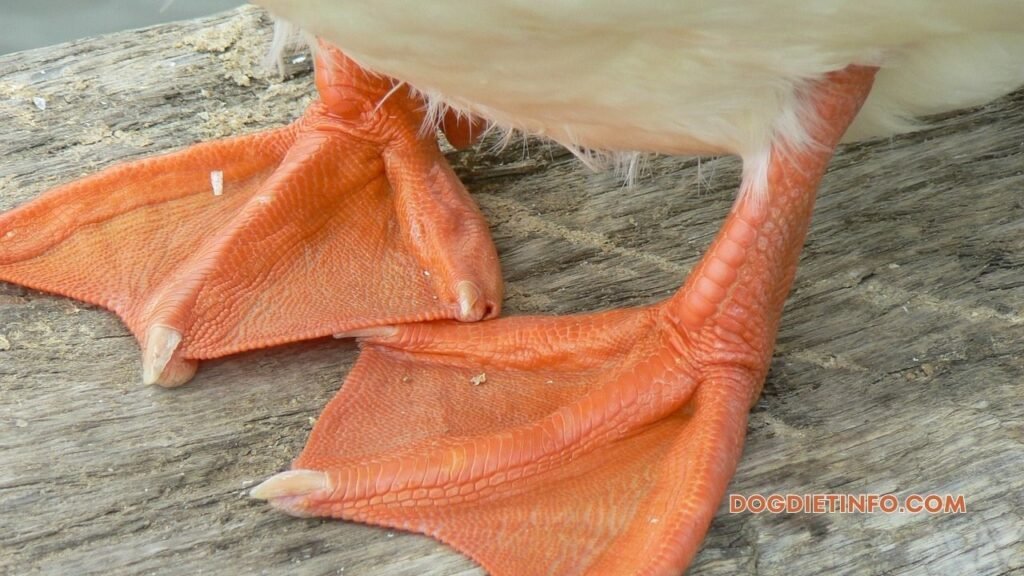Are Duck Feet Safe For Dogs? Duck feet are generally safe and beneficial for dogs as they are a natural source of glucosamine, aiding joint health.
When it comes to choosing treats for our furry companions, pet owners are increasingly looking for natural, wholesome options that contribute to overall health.
Duck feet have recently become a popular treat for dogs due to their nutrient profile and potential health benefits. But, as with any new food, many dog owners wonder, “Are duck feet safe for dogs?”
This article will explore the nutritional benefits of duck feet, their safety for canine consumption, how they compare to other treats, and tips on incorporating them into a dog’s diet safely.
Contents
What Are Duck Feet?
Duck feet treats come from the feet of ducks and can be found in raw, dehydrated, or freeze-dried forms. [Are Duck Feet Safe For Dogs?]
They provide a natural source of protein, collagen, glucosamine, and chondroitin, all of which can contribute to a dog’s overall well-being.
Description of Duck Feet Treats
Duck feet treats vary in preparation method:
- Raw Duck Feet: These are fresh or frozen, retaining their full moisture content. Raw duck feet can be given as-is or thawed from a frozen state.
- Dehydrated Duck Feet: Air-dried duck feet have most of their moisture removed, which extends their shelf life while maintaining nutritional value.
- Freeze-Dried Duck Feet: These have been freeze-dried to remove moisture, which helps retain nutrients and allows for easier storage. Freeze-drying also results in a lightweight and crunchy texture that dogs tend to enjoy.
Nutritional Composition
Duck feet are rich in essential nutrients, offering health benefits beyond those of regular dog treats. They contain:
- Glucosamine and Chondroitin: Known for their role in joint health, these compounds support cartilage formation and repair, which is particularly beneficial for aging dogs or those prone to joint problems.
- Protein: Protein is vital for muscle growth and repair. Duck feet are naturally high in protein, providing a great energy source. [Are Duck Feet Safe For Dogs?]
- Collagen: Found in the skin and bones of duck feet, collagen supports skin elasticity, healthy fur, and aids in digestive health by promoting a strong gut lining.

Benefits of Duck Feet for Dogs
Duck feet offer numerous health benefits that can positively impact a dog’s health in various ways. Here’s a closer look at the top benefits:
Joint Health Support
Joint health is essential for dogs of all ages, especially as they get older and become more prone to conditions like arthritis. [Are Duck Feet Safe For Dogs?]
Duck feet are packed with glucosamine and chondroitin, which work together to maintain and rebuild cartilage, the tissue that cushions joints.
By incorporating these compounds into a dog’s diet, pet owners can help support their pet’s mobility, reduce inflammation, and improve overall quality of life.
Dental Health
Dental health is another significant area of concern for dog owners, as plaque and tartar buildup can lead to gum disease and other issues.
The natural chewing action required to consume duck feet acts like a toothbrush, scraping away plaque and tartar from a dog’s teeth.
This helps maintain oral hygiene and can lead to fresher breath. Additionally, the chewing process stimulates saliva production, which has natural antibacterial properties and contributes to oral health.
Natural Source of Protein
Protein is a cornerstone of any dog’s diet, supporting muscle growth, tissue repair, and energy levels. [Are Duck Feet Safe For Dogs?]
Duck feet provide a high level of natural protein, which is essential for dogs, especially active breeds.
Regular protein intake aids in maintaining a strong immune system, promotes a healthy coat, and is crucial for overall vitality.
Supports Digestion
Collagen in duck feet supports digestive health by aiding in the development of a healthy gut lining. [Are Duck Feet Safe For Dogs?]
For dogs with sensitive stomachs or digestive issues, the collagen in duck feet can help soothe the gastrointestinal tract and promote nutrient absorption.
Moreover, collagen supports joint and skin health, making it a multifunctional nutrient that benefits several areas of a dog’s well-being.
Low-Fat Treat Option
Many dog treats are high in fat, which can lead to weight gain, especially for less active dogs or those with a predisposition to obesity.
Duck feet are generally low in fat, making them an excellent choice for dogs who need to maintain a healthy weight. [Are Duck Feet Safe For Dogs?]
Despite being lower in fat, they are still highly flavorful, providing dogs with a satisfying chew without excess calories.
Are Duck Feet Safe for Dogs?
Duck feet are generally safe for dogs when given as an occasional treat, but there are a few essential considerations to keep in mind.
Choosing the right type, being aware of potential risks, and supervising treat time are all part of ensuring duck feet are a safe and enjoyable option.
Types of Duck Feet Treats
- Raw Duck Feet: Raw options are safe for dogs, but be mindful of sourcing to avoid bacterial contamination. [Are Duck Feet Safe For Dogs?]
- Dehydrated & Freeze-Dried Duck Feet: These options are widely considered safe, as they have undergone a drying process that extends shelf life without compromising nutrient integrity.
- Cooked Duck Feet: Avoid cooked duck feet, as cooking can make the bones brittle and more likely to splinter, posing a risk of internal injury.
Potential Risks to Consider
Though rare, there are a few risks associated with feeding duck feet to dogs:
- Choking Hazard: Dogs, especially small breeds, may have difficulty chewing large pieces and might attempt to swallow them whole, increasing the risk of choking. Always supervise treat time, particularly if your dog is not accustomed to chewing larger items.
- Cooked Duck Feet: As mentioned, cooked bones are dangerous because they can splinter. These splinters can puncture a dog’s mouth, throat, or intestines, leading to serious health issues. Stick to raw, dehydrated, or freeze-dried options to minimize the risk.
- Bone Sensitivity: Some dogs have sensitive digestive systems or health conditions that make it difficult to digest bone. If your dog is prone to digestive upsets, consult with your veterinarian before offering any bone-based treat.
How to Safely Feed Duck Feet to Your Dog
Here are some guidelines to ensure that duck feet are safely incorporated into your dog’s diet:
Choose the Right Type
Opt for raw, freeze-dried, or dehydrated duck feet rather than cooked versions. These preparations retain the nutritional value and are safer for dogs to consume.
Portion Size & Frequency
For small dogs, half a duck foot may be sufficient, while larger dogs can handle a full one. Start with one treat per week and observe how your dog responds.
If they tolerate it well, you can gradually increase the frequency to a couple of times per week. [Are Duck Feet Safe For Dogs?]
Supervision Tips
Always supervise your dog while they chew on duck feet. Smaller breeds or dogs that gulp their food should be watched closely to avoid the risk of choking. Additionally, encourage them to chew thoroughly before swallowing.
Store Properly
Proper storage is essential to keep treats fresh and safe. Dehydrated and freeze-dried duck feet should be kept in a cool, dry place. Raw duck feet should be refrigerated or frozen to prevent bacterial growth.
Other Considerations When Feeding Duck Feet
Here are a few additional points to keep in mind:
Consult with a Veterinarian
While duck feet are generally safe, it’s always wise to consult your vet before introducing a new treat, especially if your dog has specific health issues or dietary needs.
They can provide personalized recommendations based on your dog’s health. [Are Duck Feet Safe For Dogs?]
Allergies & Sensitivities
Although uncommon, it’s possible for a dog to be allergic to duck. If you notice any signs of an allergic reaction—such as itching, redness, digestive upset, or swelling—stop feeding duck feet and consult your veterinarian.
Introduce Gradually
When introducing any new treat, it’s best to start slowly. Give a small portion first and monitor your dog’s reaction. If they experience any stomach upset, it may be necessary to discontinue use.
Final Verdict
Duck feet can be a fantastic treat for dogs, providing several health benefits, including joint support, dental care, and protein supplementation.
However, moderation is key, and raw, freeze-dried, or dehydrated versions are the safest options. [Are Duck Feet Safe For Dogs?]
With proper supervision and portion control, duck feet can be a nutritious and enjoyable addition to your dog’s treat routine.
See Also: Is Chapstick Bad For Dogs? Important Facts
FAQs
Are duck feet good for small dogs?
Yes, but cut them into smaller pieces for easier chewing and reduced choking risk. [Are Duck Feet Safe For Dogs?]
Can puppies have duck feet?
It’s best to wait until puppies have fully developed teeth and consult with a vet before introducing harder treats like duck feet.
How often should I give my dog duck feet?
Start with one per week, then adjust based on your dog’s response and dietary needs. They can be given more frequently for larger dogs that tolerate them well.
Are duck feet better than chicken feet for dogs?
Both are beneficial, but duck feet contain slightly more glucosamine due to their larger size. The choice ultimately depends on your dog’s size and preferences.
Can dogs with sensitive stomachs eat duck feet?
Some dogs with sensitive stomachs may struggle with bones, so it’s best to consult a vet if you’re unsure. [Are Duck Feet Safe For Dogs?]
Conclusion: Are Duck Feet Safe For Dogs?
In conclusion, duck feet are generally safe and beneficial for dogs when served raw, freeze-dried, or dehydrated.
Packed with essential nutrients like glucosamine and protein, they offer health benefits for joint health, dental care, and digestive support.
Duck feet make a healthy, natural treat that’s both tasty and nutritious, but be sure to monitor your dog’s reaction and consult with your vet if you have any concerns.
With the right preparation and supervision, duck feet can be a wonderful, occasional addition to your dog’s diet!

Derrick Wilcox is a certified canine behaviorist with over 12 years of experience at Happy Paws Animal Clinic and Pawsitive Training Center, helping pet owners ensure safer, healthier, and happier lives for their dogs.



